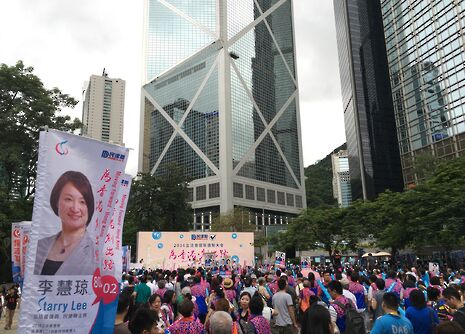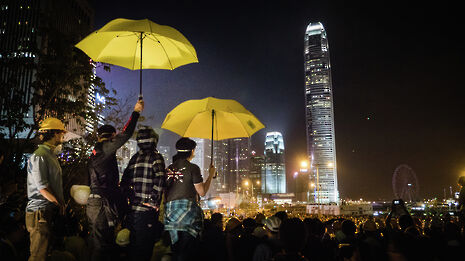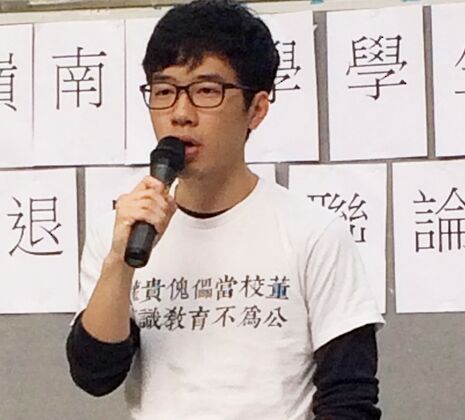Partisanship, populism and protest in Hong Kong
Cambridge Hong Kongers debate the city’s recent elections and what they could mean for the future

Anyone who cares about democracy – the system of government, the mode of selection of leaders, the set of universal values comprising liberty, social justice, and equality (and everything in between) – would do well to set their sights on the city of Hong Kong, a Special Administrative Region in China. In the past two weeks, Hong Kong has borne witness to the most important election since the 2014 Umbrella Movement, which saw protesters take to the streets against proposed electoral reforms: the 2016 Legislative Council Election. And its results are set to have a profound impact.
Dubbed ‘the world’s weirdest election’, our electoral system was designed by the British to enable proportional representation of different sectors and industries in Functional Constituencies (FCs), alongside individual civilians in Geographical Constituencies (GCs). In practice, however, the FC system ostensibly means that certain individuals, businesses, and even corporate entities have the power to determine 30 seats within the legislature, in comparison to the 35 geographical seats that are determined by popular vote.
The total electorate for the FCs is fewer than 240,000 electors and the FCs themselves are further skewed in terms of the number of people choosing one seat. (For example, in Finance, 125 electors chose one seat; in Education, it's 88,185.) Those who find themselves not belonging to one of the named FCs – in other words, 3.4 million voters – are made to choose from a list of shortlisted district councillor nominees for five ‘super seats’. Most of the (undergraduate) Hong Kong students at Cambridge were thus entitled to two votes: one for their GC, and one for the ‘everybody else’ FC.
Why is this important? This was the first time that many of the young people who participated in the 2014 Umbrella Movement were eligible to vote, alongside many adults who were previously politically apathetic but who made the decision this year to make their voices heard. This was also the first time that the loose localist ‘bloc’, whose ultimate aim is the achievement of Hong Kong’s independence, split up with the pan-democratic bloc (a group of both new and traditionally moderate, pro-universal suffrage parties), and ran for election as a stand-alone stream. These two blocs differ in their ultimate aim: while the former advocates independence (that is, the establishment of a sovereign Hong Kong city-state), the latter is more focused on self-determination – the assertion of the right of Hong Kongers to autonomously determine the future of their city.

Alongside these two groups ran the traditional pro-establishment bloc, which is widely seen to have clandestine relations with the Chinese Liaison Office in Hong Kong (prohibited according to the Basic Law), and which advocates a conservative approach to maintaining political and economic stability. This bloc firmly rejects any ideas remotely related to independence.
Both the GC and FC elections saw an unprecedentedly diverse range of candidates, all touting change and reform – in a world increasingly seen to be moving towards partisanship and populism, Hong Kong served as a microcosm of these contesting forces.
But this election was full of firsts in other ways, too: for the first time, the Electoral Procedure was strictly enforced to bar certain candidates from participating in the election. Six openly pro-independence activists were argued to be in violation of the Basic Law (Hong Kong’s ‘mini-constitution’), which, in the very first article, states that Hong Kong is an inalienable part of China, in a move widely criticized as demonstrative of the anti-democratic politics embedded within the foundations of the government. The inconsistency with which this rule was administered, with numerous pro-independence candidates being allowed to run, has further been highlighted as a sign of deficiency of procedural justice in the election.
All throughout July and August, the streets were plastered with flyers and full of campaign volunteers, as every party sought to convince pedestrians to exercise their democratic rights. Aside from Hong Kong’s future, other topics emerged as important: on the social justice front, for example, a record number of candidates indicated their support for the LGBTQ+ community, and there emerged a re-centering of rural advocacy. At the same time, certain candidates and parties received criticism for their use of ableist and misogynistic language.
For many, however, the vote ultimately came down to strategy: the anti-establishment bloc’s need to retain its veto power came up against the traditional pro-establishment parties’ desire to capitalise on the vote of the ‘silent majority’ by warning against the inefficiencies of excessive filibustering and the destabilising impact of the new localist and pan-democratic parties.
On the day – 4th September – a record 2.2 million citizens, 58 per cent of the registered electorate, ended up casting their vote. But the results of the election have been met with ambivalence. While some celebrate the opposition camp’s maintenance of its veto power, with 19 of the 35 geographical seats, and 24 total seats, the emergence of three localists, and the pan-democrats’ gaining of three out of the five ‘super seats’, others see the election as having been marred with corruption and intrigue. The optimism of many at the ‘miraculous’ victory of one of the leaders of the 2014 Umbrella Revolution protests, Nathan Law (who, along with his party, Demosistō, hopes to secure a democratic referendum in the next decade on the issue of self-determination), has been tempered by the central government’s chilling warning that anyone advocating independence will be punished.

On 8th September, Eddie Chu Hoi-Dick, the independent candidate who received the most votes in the GC on a platform of preservation and rural advocacy, held an emergency press conference outside Wan Chai police headquarters, stating that he and his family had received credible death threats, and would be seeking special protection. This was unfortunately preceded by a similar case in which another candidate, Chow Wing Kan, reportedly faced pressure from outside of Hong Kong and ended up fleeing to the UK, as well as a good number of suspected assault cases perpetrated by triad members against pro-independence candidates.
Meanwhile, the Education Bureau has banned Hong Kong independence activities in local primary and secondary schools, despite a survey by the University of Hong Kong which found that 61 per cent of students at the University of Hong Kong would want this to be their immediate future, with a support rate of 31 per cent on armed revolution for independence. The Bridgian, a round-table group founded by Cantabrigians interested in current affairs, uncovered similar results (53 per cent and 25 per cent respectively) among Hong Kong students in the UK. Debate between and within the pro-establishment and anti-establishment camps means that there are likely to be difficulties in achieving meaningful cooperation, even between parties with similar mandates. And the city’s future remains up in the air, as citizens await the 2017 Chief Executive election (which will feature only pre-approved candidates), the judicial review on candidate disqualification, and what will happen after the Basic Law becomes defunct at the end of 2046.
Deryck Chan (Civil Engineering, PhD)
I had the privilege to vote in an FC on the merit of my membership of the Institute of Electrical and Electronics Engineers. In essence, I ‘bought’ my way out of the ‘everybody else’ constituency and into the ‘rotten borough’ of Information Technology where 12,115 voters elected one legislator – a whopping 280-fold increase in voting power! Hong Kong is a place where one can quite literally ‘buy’ power legally by upskilling oneself; I wonder if that might attract Cambridge graduates. Anyway, your conscientious author voted for a candidate who campaigned on a platform of democratic reform and who would vote to abolish the FC system if the opportunity arose.
Longtin Chan (Mathematics, 4th Year)
In order to bring a solid change, the Anti-establishment Camp has a lot of work to do in the coming four years. Apart from organizing radical movements, district work should be carried out to bring their vision into our community. Radical protestors can get rid of accusations like ‘Junk Youngsters’ and try reshaping the Hong Kong society by doing community service. They can hence gain more support from the elderly who could not follow the myriad information from the Internet.
Jason Wong (HSPS, 3rd Year)
The hot-blooded, radical, and ‘youthful localist’ movement is reminiscent of similar political ‘revolutions’ that brought forth Corbyn and Sanders. Their core message, that established moderate leftists have betrayed the People’s interests, resonated with many. Commanding only a quarter of the pro-democracy vote, however, the localists must stop burning bridges with other democrats. Ultimately, whether the democrats triumph hinges on the dissidents’ ability to show a unified front.
Katie Wong (Music, Graduate)
Born and raised in Hong Kong, Lee Wai Sze (also known as Sarah Lee) received a bronze medal in the London 2012 olympics. She had a high chance for gold in Rio for the keirin race. Yet, she was caused to fall by Australian Anna Meares within the packed, speed-gaining crowd. Sarah was optimistic and was ranked sixth in women’s sprint. This is the spirit people in Hong Kong require now in the quest for democracy, to replace the negativity and fatigue after the Umbrella Revolution that happened a year ago. Would that be possible? I doubt it.
Kieran Tam (Downing, 2nd year) and Christian Mok (Homerton, 2nd year)
Whilst the protesters are right to try and reduce paternalistic interference into local affairs, they must not lose sight of the overarching fact that nothing fundamental can ever be changed. Instead of desperately trying to cordon Hong Kong off from the rest of China, protesters should be trying to work together in a spirit of mutual cooperation with the mainland to steadily try and ease the transition of the city back to Chinese rule. Therefore, in the light of the forthcoming radical shifts in Hong Kong’s legal and governmental system, it is unclear what the objective of the further protests is. Indeed, the protests lack substance and seem to only represent a pipe-dream, a fantastical ideal to harken Hong Kong back to its British colonial past.
Cambridge Student Group
Regardless of our political stance, we all have to answer one key question: How can we maintain our autonomy as a rapidly growing China dwarfs Hong Kong? Heightened opposition against Beijing over the past few years, especially among the Hong Kong youth, has only made Beijing tighten its grip on Hong Kong. From the screening of Chief Executive candidates under the proposed universal suffrage package, suspected kidnappings of booksellers to the recent debarment of LegCo election candidates, all these events showed that Beijing would only respond to Hong Kong’s anti-China sentiment with force rather than appeasement.
As a renowned International Relations professor in Hong Kong succinctly summarises the problem, “China needs Hong Kong. But whether it needs Hong Kongers, that is a different question.”
 News / Fitz students face ‘massive invasion of privacy’ over messy rooms23 April 2024
News / Fitz students face ‘massive invasion of privacy’ over messy rooms23 April 2024 News / Climate activists smash windows of Cambridge Energy Institute22 April 2024
News / Climate activists smash windows of Cambridge Energy Institute22 April 2024 News / Copycat don caught again19 April 2024
News / Copycat don caught again19 April 2024 Comment / Gown vs town? Local investment plans must remember Cambridge is not just a university24 April 2024
Comment / Gown vs town? Local investment plans must remember Cambridge is not just a university24 April 2024 News / Cambridge University disables comments following Passover post backlash 24 April 2024
News / Cambridge University disables comments following Passover post backlash 24 April 2024





